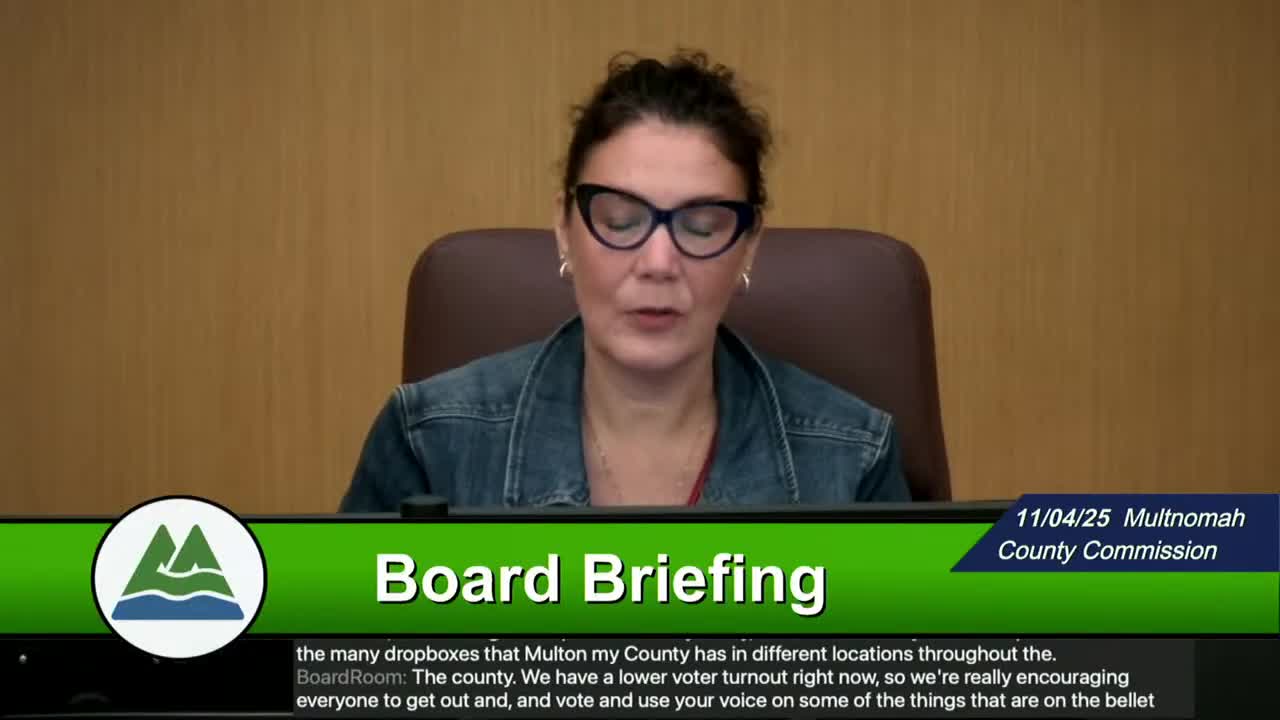Multnomah County updates library bond projects after auditor finds recycling reporting gaps
Get AI-powered insights, summaries, and transcripts
Subscribe
Summary
Multnomah County officials briefed the board on the fourth-quarter 2025 status of the Library Capital Bond Program, reporting project openings, budget changes and steps to address an auditor—s finding that the county could not verify recycling rates on four construction projects.
Multnomah County officials briefed the board on the fourth-quarter 2025 status of the Library Capital Bond Program, reporting project openings, budget changes and steps to address an auditor—s finding that the county could not verify recycling rates on four construction projects.
The finding, described by Kate Vance, deputy director for the Library Capital Bond Program, said the county relied on recycling data for Albina, Holgate, Midland and North Portland libraries "that appeared to be inaccurate and unreliable." Vance said the auditor's report, released the previous week, found that three of the four projects lost potential LEED points because of the documentation issues but that each project remains on track to achieve LEED Gold certification.
The nut graf: County staff emphasized that the recycling issue stems from industrywide challenges with construction waste tracking and that the program will pursue process improvements rather than citing immediate legal or financial penalties. "We will continue to work across departments with sustainability consultants and general contractors to identify and implement process improvements to ensure adequate reporting on future projects," Vance said.
Program managers also reported budget and contingency activity. Katie O'Dell, deputy director for the Library Capital Bond Program, said the bond portfolio added about $1.3 million in interest income and roughly $87,000 in Energy Trust of Oregon incentives during the quarter, with roughly $74,000 applied to Albina for commissioning and energy-efficiency work. The program reported released contingency savings in the multi-million-dollar range; staff cited approximately $5.4 million in released savings at one point in the presentation and later referenced about $6.0 million as a live figure.
Staff described several reallocations: the county reduced an operations center closeout by roughly $700,000 and moved funds to North Portland and Northwest projects; it added $75,000 to Saint John's for contingency savings items such as additional uplighting and a low-e film for historic windows; and it approved a third wave of contingency releases funding technology and acoustical upgrades at Central Library, door power operators at ADA restrooms, and exterior entrance improvements at Albina.
Mike Day, bond program PMO director, updated commissioners on the regional workforce equity agreement (RWIA) implemented on bond projects. Day said the program had documented 714,000 worker hours in the reporting cycle but that the current live total is closer to 800,000 hours. He told the board the program is meeting or exceeding most utilization goals for apprenticeships and minority participation and that the primary shortfall remains in "women's journey" trade hours, where the target is about 9 percent.
On next steps following the audit, staff said they will convene technical experts, prime contractors, sustainability consultants, waste-hauling vendors, Metro and City of Portland staff to address gaps in measuring and weighing commingled waste streams. Program staff explained that on constrained sites, separation of materials can be difficult and that haulers are responsible for segregating streams at their facilities. Commissioners sought assurances that the issue would not recur and asked whether the county could retroactively lose LEED points or face financial penalties. Staff said the audit caused point reductions on some projects but not enough to lose overall Gold thresholds; they also said a separate LEED challenge to the Operations Center project was unsuccessful.
Commissioners asked several budget and process questions including how internal labor is accounted for across projects, whether the contingency will be fully spent by program closeout, and how the county is supporting smaller vendors that provide recycling and waste services. Staff said contingency decisions are prioritized quarterly with recommendations to executive sponsors and that the county will work to improve vendor practices rather than pursue punitive responses where systemic issues or capacity constraints exist.
Staff also previewed openings and community amenities. O'Dell said Northwest Library is transitioning to owner move-in and is scheduled to open Jan. 10. East County Library will include a flexible auditorium (about 200 seats), a maker space, and an audio-visual studio; presenters described extensive public art, rooftop terraces and community programming spaces at several library sites, and highlighted recent community engagement activities and artist partnerships.
What happened next: staff committed to follow-up meetings with technical and regulatory partners to shore up waste tracking and documentation and to return to the board with progress in subsequent quarterly updates.
